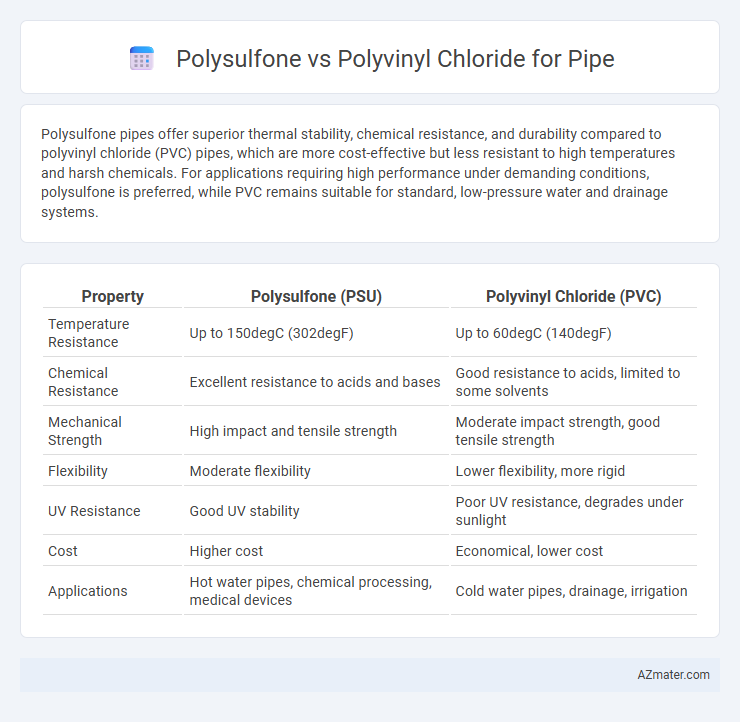Polysulfone pipes offer superior thermal stability, chemical resistance, and durability compared to polyvinyl chloride (PVC) pipes, which are more cost-effective but less resistant to high temperatures and harsh chemicals. For applications requiring high performance under demanding conditions, polysulfone is preferred, while PVC remains suitable for standard, low-pressure water and drainage systems.
Table of Comparison
| Property | Polysulfone (PSU) | Polyvinyl Chloride (PVC) |
|---|---|---|
| Temperature Resistance | Up to 150degC (302degF) | Up to 60degC (140degF) |
| Chemical Resistance | Excellent resistance to acids and bases | Good resistance to acids, limited to some solvents |
| Mechanical Strength | High impact and tensile strength | Moderate impact strength, good tensile strength |
| Flexibility | Moderate flexibility | Lower flexibility, more rigid |
| UV Resistance | Good UV stability | Poor UV resistance, degrades under sunlight |
| Cost | Higher cost | Economical, lower cost |
| Applications | Hot water pipes, chemical processing, medical devices | Cold water pipes, drainage, irrigation |
Introduction to Polysulfone and Polyvinyl Chloride Pipes
Polysulfone (PSU) pipes are high-performance thermoplastics known for their exceptional heat resistance, chemical stability, and mechanical strength, making them suitable for demanding industrial applications. Polyvinyl Chloride (PVC) pipes are widely used, cost-effective, corrosion-resistant, and easy to install, primarily serving residential, commercial, and irrigation systems. The choice between polysulfone and PVC pipes depends on temperature tolerance, chemical exposure, and pressure requirements specific to the application environment.
Chemical Properties Comparison
Polysulfone (PSU) exhibits superior chemical resistance compared to polyvinyl chloride (PVC), with exceptional stability against acids, bases, and hydrocarbons, making it ideal for aggressive chemical environments. PVC offers good resistance to mineral acids, alkalis, and salts but is less resistant to aromatic hydrocarbons and chlorinated solvents, which can cause swelling or degradation. The higher glass transition temperature of polysulfone (approximately 185degC) also contributes to better thermal and chemical resilience compared to PVC's lower thermal limit (around 60-80degC).
Mechanical Strength and Durability
Polysulfone exhibits superior mechanical strength compared to polyvinyl chloride (PVC), with higher tensile strength and impact resistance, making it suitable for demanding applications requiring robust performance. Durability-wise, polysulfone offers excellent thermal stability and resistance to hydrolysis, maintaining integrity under high-temperature and harsh chemical environments better than PVC. PVC pipes, while cost-effective and corrosion-resistant, generally have lower mechanical strength and can become brittle over time when exposed to UV light and extreme temperatures.
Thermal Stability and Temperature Resistance
Polysulfone offers superior thermal stability compared to polyvinyl chloride, maintaining structural integrity at temperatures up to 160degC, whereas polyvinyl chloride typically withstands temperatures only up to 60degC to 80degC before deforming. The high glass transition temperature of polysulfone ensures excellent resistance to thermal deformation and long-term performance in hot water and steam applications. Polyvinyl chloride pipes, although widely used for their cost-effectiveness, exhibit lower temperature resistance and are more prone to softening and degradation under prolonged heat exposure.
Corrosion and Chemical Resistance
Polysulfone pipes exhibit superior corrosion resistance compared to polyvinyl chloride (PVC), maintaining structural integrity in aggressive chemical environments such as strong acids and bases. PVC pipes offer good chemical resistance but are more susceptible to degradation and corrosion when exposed to high temperatures or concentrated solvents. The enhanced thermal stability of polysulfone makes it a preferred choice for industrial applications requiring prolonged exposure to harsh chemicals.
Applications in Industry and Construction
Polysulfone pipes offer superior thermal stability and chemical resistance, making them ideal for high-temperature industrial applications such as chemical processing and food manufacturing. Polyvinyl chloride (PVC) pipes, favored for their cost-effectiveness and corrosion resistance, are widely used in residential plumbing, drainage systems, and low-pressure construction applications. Industrial sectors requiring durability under extreme conditions often prefer polysulfone, whereas PVC remains dominant in large-scale construction projects due to ease of installation and widespread availability.
Installation and Maintenance Requirements
Polysulfone pipes provide superior chemical resistance and higher temperature tolerance, reducing the need for frequent replacement and easing long-term maintenance compared to polyvinyl chloride (PVC) pipes, which may degrade under harsh conditions. The installation of polysulfone pipes typically requires specialized tools and skilled labor due to their rigidity and thermal properties, while PVC pipes benefit from more straightforward, cost-effective installation techniques such as solvent welding or mechanical joints. Maintenance of polysulfone systems is generally less frequent but may involve higher initial costs, whereas PVC systems require regular inspections to address potential cracking or chemical damage, impacting overall lifecycle costs.
Cost Analysis: Polysulfone vs Polyvinyl Chloride
Polysulfone pipes typically incur higher upfront costs than polyvinyl chloride (PVC) due to their superior thermal stability and chemical resistance, making them ideal for specialized industrial applications. PVC pipes are more cost-effective for large-scale plumbing and irrigation systems, balancing durability with affordability and ease of installation. Despite the initial price difference, polysulfone's longer lifespan and resistance to harsh environments can reduce long-term maintenance and replacement expenses compared to PVC.
Environmental Impact and Sustainability
Polysulfone (PSU) pipes demonstrate superior environmental sustainability compared to Polyvinyl Chloride (PVC) due to their higher resistance to chemical degradation and extended lifecycle, reducing the frequency of replacements and waste. PVC production involves chlorinated compounds and releases hazardous dioxins, contributing to environmental pollution and challenges in recycling. Polysulfone's thermal stability and recyclability enhance its eco-friendliness, making it a preferable choice for sustainable piping solutions in industrial and municipal applications.
Choosing the Right Pipe Material: Key Considerations
Polysulfone offers superior chemical resistance, high temperature tolerance up to 150degC, and excellent mechanical strength, making it ideal for demanding industrial pipe applications. Polyvinyl chloride (PVC) provides cost-effective durability, good corrosion resistance, and suitability for temperatures up to 60degC, commonly used in residential plumbing and irrigation systems. Selecting the right pipe material depends on factors such as operating temperature, chemical exposure, pressure requirements, and budget constraints.

Infographic: Polysulfone vs Polyvinyl chloride for Pipe
 azmater.com
azmater.com